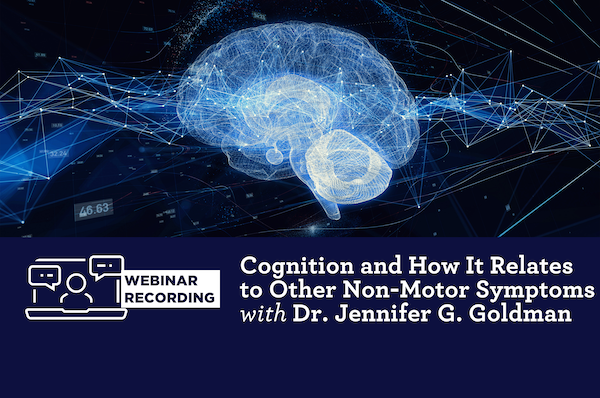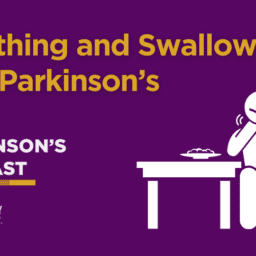In this webinar, Dr. Jennifer Goldman, the Section Chief for Parkinson’s Disease and Movement Disorders Rehabilitation at the Shirley Ryan Abilitylab and Professor of Physical Medicine and Rehabilitation and Neurology at Northwestern University Feinberg School of Medicine walks us through the complicated topic of cognition in Parkinson’s and how cognition interacts with other non-motor symptoms.
Dr. Soania Mathur, a family physician and Davis Phinney Foundation Board Member who has been living with Parkinson’s for over 20 years, moderates the discussion and makes it useful and accessible for people with Parkinson’s and their care partners.
To get access to the recording of the webinar, click here.
Some of the topics touched on in this webinar include:
- Parkinson’s Disease Psychosis (PDP)
- hallucinations
- delusions
- medication side effects
- management
- advice for care partners and family members
- Cognitive decline
- Mild cognitive impairment (MCI)
- dementia
- medication side effects
- advice for persons with Parkinson’s
- advice for care partners
- Care partner stress
One issue that came up during the cognition and other non-motor symptoms webinar that we also wanted to address here was the issue of what to do if your person with Parkinson’s is in acute distress. A viewer asked this important question:
“Dr. Goldman advised that patients who are acutely experiencing symptoms related to psychosis to follow up with their MDS and/or go immediately to ER. Most MDS are quite busy and an urgent appointment may be difficult, if not impossible, to attain. On the ER side, we know that most ED physicians and staff have limited knowledge of PD and psychosis related to PD. There are many anti-psychotic meds that are clearly contraindicated for people with PD – they cause worsening of symptoms. These meds are noted as “meds to avoid” in the EVC. (Every Victory Counts manual) The presenter made no mention of these drugs; the odds are high that a patient presenting to the ER with psychotic symptoms will receive one of them.”
When we received this question, we immediately reached out to Dr. Goldman, and she provided this very detailed response:
“For people with Parkinson’s and their care partners, it is important to always share their list of medications with all physicians and any emergency or hospital personnel. Keep these written down or as a list available on one’s phone. In addition, there are certain medications that people with Parkinson’s should NOT take since they act as anti-dopamine medications and can worsen parkinsonian motor features.
Some of the medications on this “DO NOT GIVE” list include several that are used to treat psychosis, agitation or mood disorders. However, they are not appropriate for people with Parkinson’s, and we want to avoid any situations where they may be given in urgent/emergency situations, during hospital stays or in outpatient clinical care. Medications on this list include, but are not limited to typical antipsychotics (haloperidol and others) and many atypical antipsychotics (risperidone, olanzapine and others). If medications are needed for psychosis in Parkinson’s, these may be considered: pimavanserin (Nuplazid, FDA approved to treat Parkinson’s disease psychosis), quetiapine (Seroquel), clozapine (Clozaril); cholinesterase inhibitors (typically used for PD dementia) may play a role.
Besides the antipsychotics listed above, there are other medications that block dopamine and may be used for other reasons like nausea or vomiting. These should also be on the “DO NOT GIVE” list and include but are not limited to, prochlormethazine (Compazine), metoclopramide (Reglan) and promethazine (Phenergan). If medications are needed for nausea or vomiting in Parkinson’s, these may be considered: ondansetron (Zofran), domperidone (Motilium), trimethobenzamide (Tigan), dolasetron (Anzemet) or granisetron (Kytril). Always check with your physician about your medications.
If a person with Parkinson’s is hospitalized, it is important to reinforce to hospital staff to avoid these medications and to alert them that Parkinson’s medications must be given on time, every time.”
We know how difficult hospital stays can be for people with Parkinson’s, especially those that are unexpected. We’ll be sharing some information on how to advocate for yourself or your loved one if you end up in the ER, but for now, it is a good idea to create a document you can take with you that includes advice about medications and have your doctor sign it. Keep it with you and give it to the doctors as soon as you arrive.
ADDITIONAL RESOURCES
How are Depression, Anxiety, and Apathy Treated?
Impulse Control Disorders and Parkinson’s: What are they and how to manage them
Is Depression Common for People with Parkinson’s?
Depression & Anti-Depressant Medication with Parkinson’s
Anticholinergic Medications to Avoid
Anticholinergic Drugs Linked with Dementia
Dopamine Agonist Withdrawal Syndrome
Deep Brain Stimulation May Increase Dementia Risk in Some Parkinson’s Patients, Study Suggests
TOP 10 Siri Commands for Memory Loss, Dementia, Early-Stage Alzheimer’s
This webinar was made possible by a grant* from Acorda Therapeutics and by sponsorship* by Kyowa Kirin.
*While the generous support of this grant and our sponsors makes our educational programs available,
their donations do not influence Davis Phinney Foundation content, perspective, or speaker selection.

















